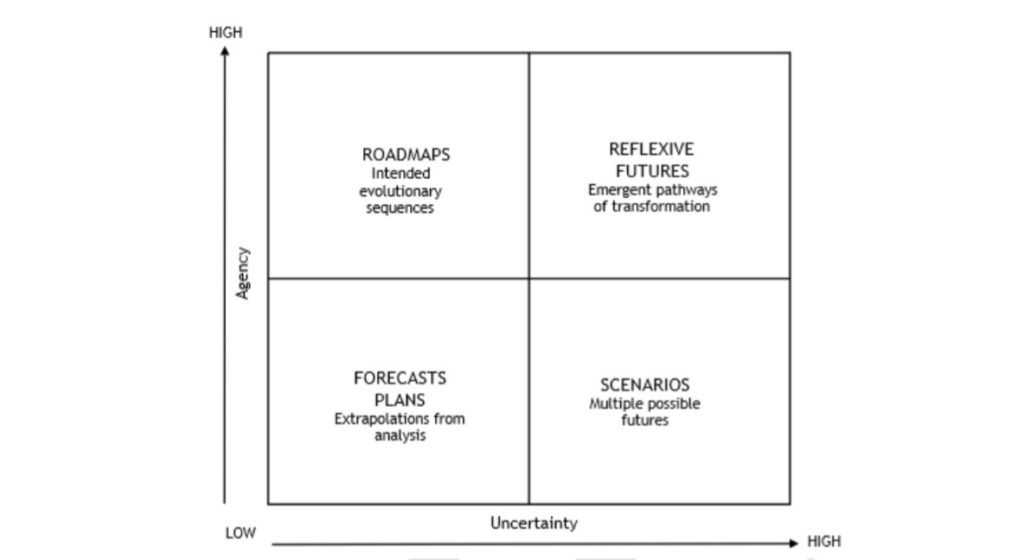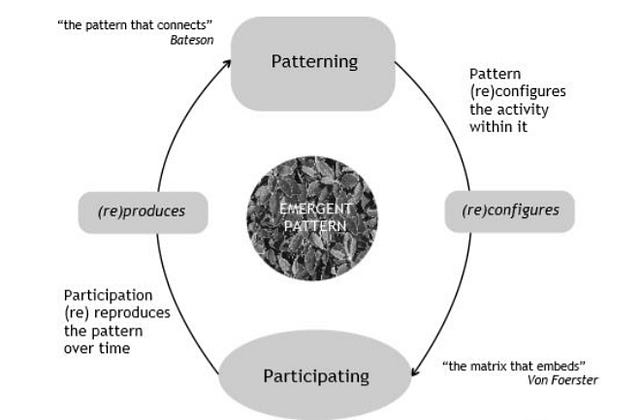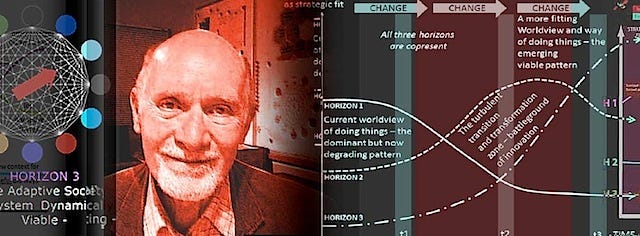
I have the pleasure and the privilege to count Tony as a friend, a mentor and a colleague for more than a decade now. We connected over a UNITAR sustainability workshop in Scotland that I co-organized and facilitated which his wife attended. Their company name— Decision Integrity Ltd — sparked my curiosity. I did a bit of research and was amazed by the many parallels and connections I found to other key mentors of mine like Brian Goodwin and Henri Bortoft. Our first conversation was a four hour mind-melt at the end of which both of us were exhilarated and surprised at how time had past.
Tony invited me into the International Futures Forum in 2009. He gave me an opportunity to work with him in piloting early versions of the IFF World Game. In 2010 he hired me through his consultancy to do research and apply whole systems thinking and the IFF World Systems Model to two UK Foresight projects. In one of them we mapped the international dimension of climate change impact on 17 regions of the globe and how these would in turn affect the future of the UK. For the other, we tried to reveal systemic patterns and make visual sense out of the research a team of experts had done on migration and global environmental change.
Tony and I have also taught a three part workshop series on ‘Applied Systems Thinking’ together at Findhorn College, collaborated in various International Futures Forum project on ‘Transformative Resilience’, ‘The 3 Horizons Framework’, and ‘Second Order Science and Policy’; and occasionally I joined a meeting or support efforts towards the creation of H3uni. In short, I have been richly gifted opportunities to learn from this remarkable wise elder. What’s more, he kindly gives me the feeling that our friendship has been mutually fruitful. I still remember Tony pulling my leg for having a PhD in our early collaborations. Later he completed his PhD in systems science shortly before his 80th birthday.
It is my pleasure to have been asked to read and review his forthcoming book. I thoroughly enjoyed Tony’s first book Ready for Anything: Designing Resilience for a Transforming World in which he explains the World Systems Model and World Game he developed with colleagues in the IFF and documents their diverse applications.
Tony’s new book — Systems Thinking for a Turbulent World: A Search for New Perspectives (currently under review with Routledge)— invites us into becoming reflexive practitioners of the art and science of re-patterning and co-creating an uncertain future through a deeper appreciation of the qualities inherent in the future potential of the present moment.
The book offers new ways of embracing uncertainty in a complex world yet nevertheless finding constructive ways to collaborate with others ready to chart our collective path into a future that will surprise us while also taking seriously our co-creative agency to affect that future.
Tony gently reminds the reader about the necessary humility and sensitivity to patterns with which this turbulent world of ours demands to be met, if we hope to chart a wise path into the future. He is himself a skilled practitioner versed in the art of facilitating the emergence of collective intelligence to make sense of complexity. Many techniques for this important work Tony developed and refined himself in over 50 years of consultancy and futures practice.
This book is a high-level crash course in systems science, futures, multi-perspectival integration, anticipation and repatterning. Intrigued yet? Let Tony guide you on this journey into reflexive practice, anticipatory consciousness and the increased capacity to savour and work with others in the qualitative re-perception of the future potential of the present moment.
Systems Thinking for a Turbulent World is a timely book offered by an experienced elder so that we may collectively learn to make the best out of the turbulent times ahead. It invites us to understand systems thinking not as an intellectual exercises for academics in their ivory tower, but as a “qualitative practice” that depends on developing a new capacity for dynamic thought.
Tony suggests that the crisis of perception or the crises of consciousness that underlies so many of the converging crises we are faced with can be traced back to “our failure to appreciate the nature of wholeness and the role that qualities play in structured processes, whether external to ourselves or internal to our perceptions.” He suggests that our tendency to “treat these two aspects as separate rather than as a seamless participation in the world process through our consciousness” further intensifies rather than resolves these crises.
“Without the sense of wholeness we fail to cultivate the perceptions and skills to navigate the hyperturbulent world. Fundamental to understanding this view of understanding is the appreciation of the relationship between structure and process.” — Anthony Hodgson
The ‘understanding’ Tony tries to guide us towards in this remarkable book that is possibly (still) ahead of its time “combines Gregory Bateson’s insight into ‘the pattern that connects’ with Heinz von Foerster’s ‘matrix that embodies’ and Varela’s notion of enactive cognition where neither representation nor mechanism alone explain knowing.”

Systemic reality as a recurrent participative process (Sharpe)
Tony argues that as we investigate the nature of the structure-process relationship even deeper we come to see the pair as a dilemma: “if we concentrate wholly on systems as an external property of the world then we will increasingly become divorced from our presence in their applications. On the other hand if we concentrate exclusively on the reflecting and philosophising we will become divorced from meaningful practice.”
The creative tension of the polarity of this dilemma might not be resolvable, rather we have to learn to navigate it wisely. This challenges us to practice continuous transformative innovation driven by participative repatterning. Tony’s book introduces such a dynamic approach to systems thinking “that integrates the objectivity of systems with the subjectivity of thinking” and reminds us that “navigating the dilemma requires also the integration of futures thinking.” He argues that the “value of a conscious dilemma is that it creates an ongoing generative space. It is a continuously evolving story.”
Tony admits towards the end of the book that “we do not yet have a form of systems thinking that fully embraces perception of qualities” and suggest that his former mentor’s (J.G. Bennett’s) ‘General Systematics’ might still be the best candidate for being a sound basis for “qualitative systems thinking” that distinguishes a set of generic patterns connecting “the world of fact with the world of value in a reciprocal way.”
Among the fundamental qualities that J.G. Bennett and his colleagues suggested we need to pay closer attention to if we want to engaged in qualitative and dynamic systems thinking which allows us to related to systems as “organic unfolding” are the following:
- “wholeness as unity in diversity and diversity in unity
- complementarity from the mutual dependency of opposite poles
- relationships enabling dynamism and change
- order enabling a field of action
- significance arising from reciprocal engagement between system and context
- coherence arising from coalescence of essential sustaining factors
- manifestation through interplay of structure and process
- holism interweaving autonomy and integration
- transformation through the correlation of independent but mutually relevant processes”
Tony suggests that a new approach to applied systems thinking as reflexive futures practice is developing that will pay closer attention to these qualities. This approach might “start to reconnect our fragmented decomposed world and discover pathways to the reintegration of humans in nature and better intercultural understanding.” May it be so!
[NOTE: This review is based on a manuscript still under review. Systems Thinking for a Turbulent World: A Search for New Perspectives by Anthony Hodgson will be published by Routledge (most likely) later this year.]
Further reading by Anthony Hodgson:
Towards an Ontology of the Present Moment, Anthony Hodgson, in On The Horizon Vol x (2013) Emerald Publications
A Transdiciplinary World Model, Anthony Hodgson, in Systems Research and Behavioural Science, Vol (2012) John Wiley
An Image of Global Integrity; The parameters of an enlightened global society, Anthony Hodgson, in Network Review Spring 2011
Seeing in Multiple Horizons: Connecting Futures to Strategies, Andrew Curry and Anthony Hodgson, The Journal of Futures Studies Volume 13 Number 1 (2008)
Appreciating the Future, Anthony Hodgson, in — Scenarios for SuccessEditors Bill Sharpe and Kees van der Heijden (2007) John Wiley
Ready for Anything: Designing Resilience for a Transforming World, Anthony Hodgson, (2011) Triarchy Press, UK

Dr. Anthony Hodgson (Image Source)





